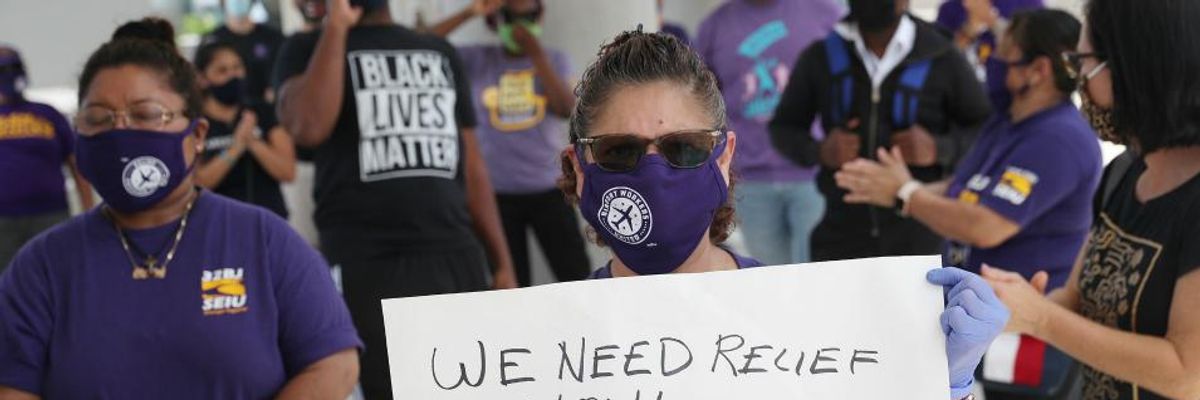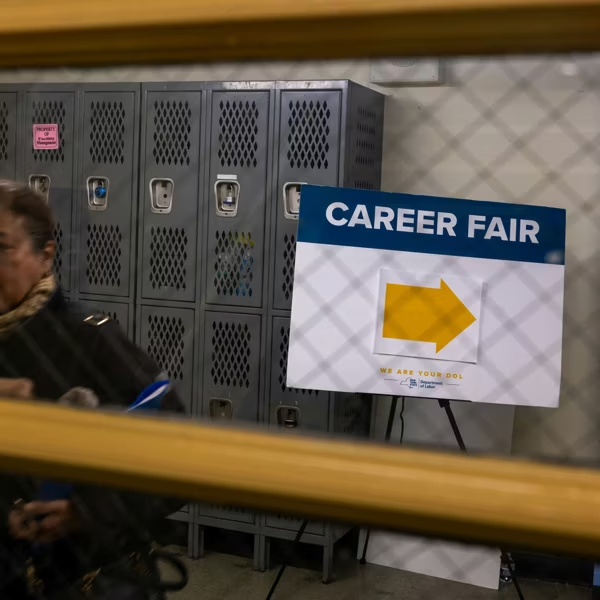
Unemployed airport workers and others hold a demonstration on August 13, 2020 in Fort Lauderdale, Florida. (Photo: Joe Raedle/Getty Images)
'The Situation Is Dire': As Trump Takes Victory Lap, New Jobs Report Reveals Alarming Surge in Permanent Unemployment
"The pain is nowhere near over for millions of workers and their families across the country."
President Donald Trump on Friday wasted no time taking a victory lap after the Bureau of Labor Statistics announced the U.S. unemployment rate fell to 8.4% in August, but economists warned a closer look at the new economic figures reveals an alarming surge in permanent joblessness that could portend a prolonged recession if Congress and the White House fail to quickly approve additional relief.
"The failure of the Trump administration to control the virus has led to a slower pace of job gains and, while the jobless rate fell significantly last month, it is still in recessionary territory and more job seekers are at risk of longer-term unemployment."
--Jared Bernstein, Center on Budget and Policy Priorities
The number of Americans classified as permanently unemployed--as opposed to being on temporary furlough--grew by 534,000 in August even as the U.S. economy added 1.4 million jobs. On Twitter, Trump celebrated the latter data point as "great" and "much better than expected."
The total number of workers who are permanently jobless is now 3.4 million, according to the bureau's latest data. Elise Gould, senior economist at the Economic Policy Institute (EPI), wrote in a blog post Friday that contrary to the White House's rosy spin, the new BLS report shows "the pain is nowhere near over for millions of workers and their families across the country."
"At this point, the U.S. economy is still down 11.5 million jobs from where it was in February, before the pandemic hit," wrote Gould. "With this kind of slowing in job growth, it will take years to return to the pre-pandemic labor market. And, without the $600 boost to unemployment insurance, jobs will return even more slowly than had policymakers stepped up and continued that vital support to workers and the economy."
EPI's Heidi Shierholz echoed Gould's assessment, noting in a series of tweets that "the situation is dire" and "the labor market remains in crisis."
\u201cThis is the most important chart from today: a growing number of permanent job losses because of the Administration's inept public health response to the virus and a lack of additional fiscal support.\u201d— Bharat Ramamurti (@Bharat Ramamurti) 1599229821
On top of the growing number of Americans whose jobs have completely disappeared due to the Covid-19 pandemic and resulting economic collapse, economist Jared Bernstein noted that another "worrisome development" spotlighted by the new BLS report is "the shift to longer-term unemployment: the share of job losers unemployed for at least 15 weeks has gone from 8% in April to 60% in August."
"In sum, the failure of the Trump administration to control the virus has led to a slower pace of job gains and, while the jobless rate fell significantly last month, it is still in recessionary territory and more job seekers are at risk of longer-term unemployment," wrote Bernstein, a senior fellow at the Center on Budget and Policy Priorities. "Importantly, note that this shift is occurring as Congress, particularly Senate Republicans, has dropped the ball on further fiscal relief."
" Mitch McConnell and the do-nothing Republican Senate refuse to help the working class. Pathetic."
--Sen. Bernie Sanders
As Common Dreams reported Thursday, Senate Republicans are preparing to vote as soon as next week on a "skinny" coronavirus relief package that would provide a $300-per-week federal unemployment supplement--just half of the $600 weekly payment the GOP allowed to expire in July--as well as additional funding measures that Democratic lawmakers decried as woefully inadequate.
In a Dear Colleague letter (pdf) on Thursday, Senate Minority Leader Chuck Schumer (D-N.Y.) slammed the GOP proposal as an attempt "to 'check the box' and give the appearance of action rather than actually meet the truly profound needs of the American people."
"With no money for rental assistance, no money for nutrition assistance, and no money for state and local services, the census, or safe elections," wrote Schumer, "Senate Republicans would be making another unacceptable and ineffective attempt at providing relief."
The Washington Post's Jeff Stein reported Friday that the decline in the unemployment rate "emboldens voices in White House saying more stimulus is unnecessary," even as economists warn that failing to provide additional relief funds--including substantial aid to cash-strapped state and local governments--could have catastrophic economic consequences in the near future.
Despite several recent attempts to jumpstart negotiations, Covid-19 relief talks between the White House, Schumer, Senate Majority Leader Mitch McConnell (R-Ky.), and House Speaker Nancy Pelosi (D-Calif.) have been stalled for weeks as tens of millions of Americans attempt to meet basic needs with drastically reduced incomes.
"Nearly 30 million Americans are going hungry," Sen. Bernie Sanders (I-Vt.) tweeted Friday. "Meanwhile, three members of the Walton family grew their wealth by $3.7 billion in a single day. Mitch McConnell and the do-nothing Republican Senate refuse to help the working class. Pathetic."
An Urgent Message From Our Co-Founder
Dear Common Dreams reader, The U.S. is on a fast track to authoritarianism like nothing I've ever seen. Meanwhile, corporate news outlets are utterly capitulating to Trump, twisting their coverage to avoid drawing his ire while lining up to stuff cash in his pockets. That's why I believe that Common Dreams is doing the best and most consequential reporting that we've ever done. Our small but mighty team is a progressive reporting powerhouse, covering the news every day that the corporate media never will. Our mission has always been simple: To inform. To inspire. And to ignite change for the common good. Now here's the key piece that I want all our readers to understand: None of this would be possible without your financial support. That's not just some fundraising cliche. It's the absolute and literal truth. We don't accept corporate advertising and never will. We don't have a paywall because we don't think people should be blocked from critical news based on their ability to pay. Everything we do is funded by the donations of readers like you. Will you donate now to help power the nonprofit, independent reporting of Common Dreams? Thank you for being a vital member of our community. Together, we can keep independent journalism alive when it’s needed most. - Craig Brown, Co-founder |
President Donald Trump on Friday wasted no time taking a victory lap after the Bureau of Labor Statistics announced the U.S. unemployment rate fell to 8.4% in August, but economists warned a closer look at the new economic figures reveals an alarming surge in permanent joblessness that could portend a prolonged recession if Congress and the White House fail to quickly approve additional relief.
"The failure of the Trump administration to control the virus has led to a slower pace of job gains and, while the jobless rate fell significantly last month, it is still in recessionary territory and more job seekers are at risk of longer-term unemployment."
--Jared Bernstein, Center on Budget and Policy Priorities
The number of Americans classified as permanently unemployed--as opposed to being on temporary furlough--grew by 534,000 in August even as the U.S. economy added 1.4 million jobs. On Twitter, Trump celebrated the latter data point as "great" and "much better than expected."
The total number of workers who are permanently jobless is now 3.4 million, according to the bureau's latest data. Elise Gould, senior economist at the Economic Policy Institute (EPI), wrote in a blog post Friday that contrary to the White House's rosy spin, the new BLS report shows "the pain is nowhere near over for millions of workers and their families across the country."
"At this point, the U.S. economy is still down 11.5 million jobs from where it was in February, before the pandemic hit," wrote Gould. "With this kind of slowing in job growth, it will take years to return to the pre-pandemic labor market. And, without the $600 boost to unemployment insurance, jobs will return even more slowly than had policymakers stepped up and continued that vital support to workers and the economy."
EPI's Heidi Shierholz echoed Gould's assessment, noting in a series of tweets that "the situation is dire" and "the labor market remains in crisis."
\u201cThis is the most important chart from today: a growing number of permanent job losses because of the Administration's inept public health response to the virus and a lack of additional fiscal support.\u201d— Bharat Ramamurti (@Bharat Ramamurti) 1599229821
On top of the growing number of Americans whose jobs have completely disappeared due to the Covid-19 pandemic and resulting economic collapse, economist Jared Bernstein noted that another "worrisome development" spotlighted by the new BLS report is "the shift to longer-term unemployment: the share of job losers unemployed for at least 15 weeks has gone from 8% in April to 60% in August."
"In sum, the failure of the Trump administration to control the virus has led to a slower pace of job gains and, while the jobless rate fell significantly last month, it is still in recessionary territory and more job seekers are at risk of longer-term unemployment," wrote Bernstein, a senior fellow at the Center on Budget and Policy Priorities. "Importantly, note that this shift is occurring as Congress, particularly Senate Republicans, has dropped the ball on further fiscal relief."
" Mitch McConnell and the do-nothing Republican Senate refuse to help the working class. Pathetic."
--Sen. Bernie Sanders
As Common Dreams reported Thursday, Senate Republicans are preparing to vote as soon as next week on a "skinny" coronavirus relief package that would provide a $300-per-week federal unemployment supplement--just half of the $600 weekly payment the GOP allowed to expire in July--as well as additional funding measures that Democratic lawmakers decried as woefully inadequate.
In a Dear Colleague letter (pdf) on Thursday, Senate Minority Leader Chuck Schumer (D-N.Y.) slammed the GOP proposal as an attempt "to 'check the box' and give the appearance of action rather than actually meet the truly profound needs of the American people."
"With no money for rental assistance, no money for nutrition assistance, and no money for state and local services, the census, or safe elections," wrote Schumer, "Senate Republicans would be making another unacceptable and ineffective attempt at providing relief."
The Washington Post's Jeff Stein reported Friday that the decline in the unemployment rate "emboldens voices in White House saying more stimulus is unnecessary," even as economists warn that failing to provide additional relief funds--including substantial aid to cash-strapped state and local governments--could have catastrophic economic consequences in the near future.
Despite several recent attempts to jumpstart negotiations, Covid-19 relief talks between the White House, Schumer, Senate Majority Leader Mitch McConnell (R-Ky.), and House Speaker Nancy Pelosi (D-Calif.) have been stalled for weeks as tens of millions of Americans attempt to meet basic needs with drastically reduced incomes.
"Nearly 30 million Americans are going hungry," Sen. Bernie Sanders (I-Vt.) tweeted Friday. "Meanwhile, three members of the Walton family grew their wealth by $3.7 billion in a single day. Mitch McConnell and the do-nothing Republican Senate refuse to help the working class. Pathetic."
President Donald Trump on Friday wasted no time taking a victory lap after the Bureau of Labor Statistics announced the U.S. unemployment rate fell to 8.4% in August, but economists warned a closer look at the new economic figures reveals an alarming surge in permanent joblessness that could portend a prolonged recession if Congress and the White House fail to quickly approve additional relief.
"The failure of the Trump administration to control the virus has led to a slower pace of job gains and, while the jobless rate fell significantly last month, it is still in recessionary territory and more job seekers are at risk of longer-term unemployment."
--Jared Bernstein, Center on Budget and Policy Priorities
The number of Americans classified as permanently unemployed--as opposed to being on temporary furlough--grew by 534,000 in August even as the U.S. economy added 1.4 million jobs. On Twitter, Trump celebrated the latter data point as "great" and "much better than expected."
The total number of workers who are permanently jobless is now 3.4 million, according to the bureau's latest data. Elise Gould, senior economist at the Economic Policy Institute (EPI), wrote in a blog post Friday that contrary to the White House's rosy spin, the new BLS report shows "the pain is nowhere near over for millions of workers and their families across the country."
"At this point, the U.S. economy is still down 11.5 million jobs from where it was in February, before the pandemic hit," wrote Gould. "With this kind of slowing in job growth, it will take years to return to the pre-pandemic labor market. And, without the $600 boost to unemployment insurance, jobs will return even more slowly than had policymakers stepped up and continued that vital support to workers and the economy."
EPI's Heidi Shierholz echoed Gould's assessment, noting in a series of tweets that "the situation is dire" and "the labor market remains in crisis."
\u201cThis is the most important chart from today: a growing number of permanent job losses because of the Administration's inept public health response to the virus and a lack of additional fiscal support.\u201d— Bharat Ramamurti (@Bharat Ramamurti) 1599229821
On top of the growing number of Americans whose jobs have completely disappeared due to the Covid-19 pandemic and resulting economic collapse, economist Jared Bernstein noted that another "worrisome development" spotlighted by the new BLS report is "the shift to longer-term unemployment: the share of job losers unemployed for at least 15 weeks has gone from 8% in April to 60% in August."
"In sum, the failure of the Trump administration to control the virus has led to a slower pace of job gains and, while the jobless rate fell significantly last month, it is still in recessionary territory and more job seekers are at risk of longer-term unemployment," wrote Bernstein, a senior fellow at the Center on Budget and Policy Priorities. "Importantly, note that this shift is occurring as Congress, particularly Senate Republicans, has dropped the ball on further fiscal relief."
" Mitch McConnell and the do-nothing Republican Senate refuse to help the working class. Pathetic."
--Sen. Bernie Sanders
As Common Dreams reported Thursday, Senate Republicans are preparing to vote as soon as next week on a "skinny" coronavirus relief package that would provide a $300-per-week federal unemployment supplement--just half of the $600 weekly payment the GOP allowed to expire in July--as well as additional funding measures that Democratic lawmakers decried as woefully inadequate.
In a Dear Colleague letter (pdf) on Thursday, Senate Minority Leader Chuck Schumer (D-N.Y.) slammed the GOP proposal as an attempt "to 'check the box' and give the appearance of action rather than actually meet the truly profound needs of the American people."
"With no money for rental assistance, no money for nutrition assistance, and no money for state and local services, the census, or safe elections," wrote Schumer, "Senate Republicans would be making another unacceptable and ineffective attempt at providing relief."
The Washington Post's Jeff Stein reported Friday that the decline in the unemployment rate "emboldens voices in White House saying more stimulus is unnecessary," even as economists warn that failing to provide additional relief funds--including substantial aid to cash-strapped state and local governments--could have catastrophic economic consequences in the near future.
Despite several recent attempts to jumpstart negotiations, Covid-19 relief talks between the White House, Schumer, Senate Majority Leader Mitch McConnell (R-Ky.), and House Speaker Nancy Pelosi (D-Calif.) have been stalled for weeks as tens of millions of Americans attempt to meet basic needs with drastically reduced incomes.
"Nearly 30 million Americans are going hungry," Sen. Bernie Sanders (I-Vt.) tweeted Friday. "Meanwhile, three members of the Walton family grew their wealth by $3.7 billion in a single day. Mitch McConnell and the do-nothing Republican Senate refuse to help the working class. Pathetic."

